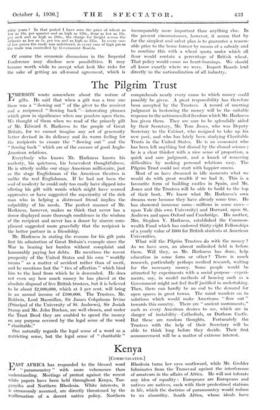The Pilgrim Trust
VIMERSON wrote somewhere about the nature of gifts. He said that when a gift was a true one there was a "flowing out" of the giver to the receiver and a reciprocal "flowing back "—interesting phrases which grow in significance when one ponders upon them. We thought of them when we read of the princely gift of Mr. Edward S. Harkness to the people of Great Britain, for we cannot imagine any act of generosity better devised in its delicacy and its warm feeling for the recipients to ensure the "flowing out" and the "flowing back" which are of the essence of good Anglo- American relations.
Everybody who knows Mr. Harkness knows his modesty, his quietness, his benevolent thoughtfulness. He is utterly unlike our stage American millionaire, just as the stage Englishman of the American theatres is unlike the real Englishman. If he had not been the soul of modesty he could only too easily have slipped Into offering his gift with words which might have seemed oppressive or have suggested the superiority of the rich man who in helping a distressed friend implies the culpability of his needs. The perfect manner of Mr. Harkness, however, makes us think that never has a donor displayed more thorough confidence in the wisdom of the recipient and never has a donor by sincere corn- pliment suggested more gracefully that the recipient is the better partner in a friendship.
Mr. Harkness in stating the reasons for his gift puts first his admiration of Great Britain's example since the War in bearing her burden without complaint and honourably paying her debts. He mentions the recent prosperity of the United States and his own " worldly means" as a matter of accident rather than of merit, and he mentions last the "tics of affection" which bind him to the land from which he is descended. He does not even say how much money he has placed at the absolute disposal of five British trustees, but it is believed to be about £2,000,000, which at 5 per cent, will bring in an annual income of £100,000. The Trustees, Mr. Baldwin, Lord Macmillan, Sir James Colquhoun Irvine (Principal of the University of St. Andrews), Sir Josiah Stamp And Mr. John Buchan, are well chosen, and under the Trust Deed they are enabled to spend the money on any purpose covered by the legal sense of the word "charitable."
One naturally regards the legal sense of a word as a restricting sense, but the legal sense of " charitable"
comprehends nearly every cause to which money could possibly be given. A great responsibility has therefore been accepted by the Trustees. A record of unerring judgment in bestowing the money will be the suitable response to the untrammelled freedom which Mr. Harkness has given them. They are sure to be splendidly aided by their Secretary, Mr. Torn Jones, who was Deputy Secretary to the Cabinet, who resigned to take up his new post, and who has lately been studying Charitable Trusts in the United States. He is an economist who has been left anything but dismal by the dismal science ; he is a clear thinker with a nice sense of proportion, a quick and sure judgment, and a knack of removing difficulties by making personal relations easy. The Pilgrim Trust could not start with happier omens.
Most of us have dreamed in idle moments what we would do with great wealth if we had it. This is a favourite form of building castles in Spain; and Mr. Jones and the Trustees will be able to build to the top of their bent. We know what Mr. Harkness's own dreams were because they have already come true. He has showered immense sums—millions in some cases— upon Yale (his own University) and Harvard, upon St. Andrews and upon Oxford and Cambridge. His mother, Mrs. Stephen V. Harkness, established the Common- wealth Fund which has endowed thirty-eight Fellowships of a yearly value of £000 for British students at American Universities.
What will the Pilgrim Trustees do with the money ? As we have seen, an almost unlimited field is before them. Will they, as Mr. Harkness has done, help education in some form or other ? There is much research, particularly perhaps medical research, waiting for the necessary money. Some people would be attracted by experiments with a social purpose—experi- ments, say, in model methods of housing such as a Government might not feel itself justified in undertaking. Then, there can hardly be an end to the demand for open spaces in great towns. The mind wanders on to solutions which would make Americans "flow out" towards this country. There are " ancient monuments," such as every American desires to see, which are in danger of instability—Cathedrals, or Durham Castle. But these are random thoughts. Fortunately the Trustees with the help of their Secretary will be able to think long before they decide. Their first announcement will be a matter of extreme interest.




















































 Previous page
Previous page